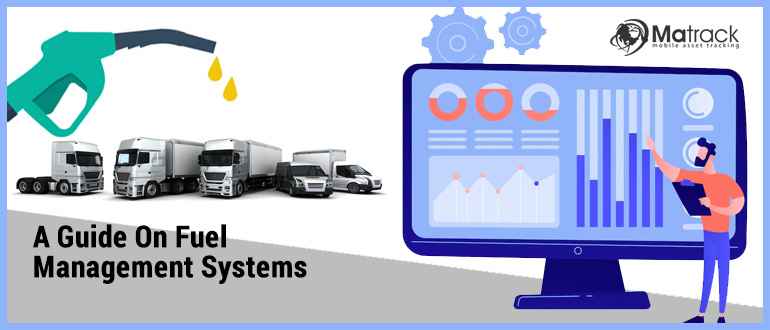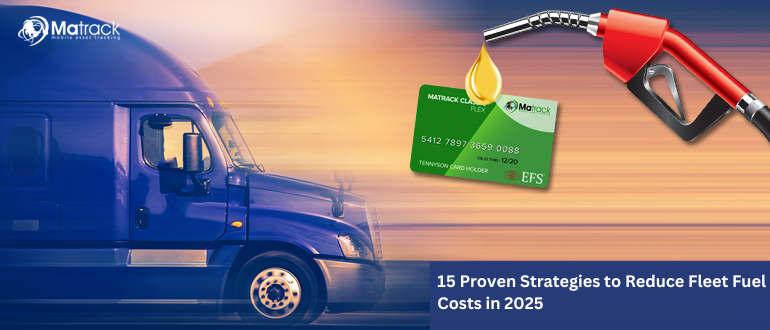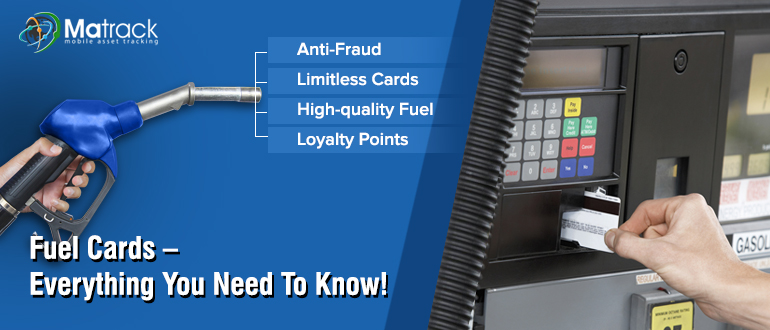Key Takeaways
- Fuel Management Systems help fleets save costs by optimizing fuel usage and reducing waste.
- Real-time tracking and GPS integration provide accurate data for better route planning and fuel monitoring.
- Matrack Fleet Fuel Card reduces fuel expenses by routing vehicles to the cheapest gas stations.
- Features like fraud alerts and spending limits enhance security and improve expense accountability.
What is a Fuel Management System?
Fuel Management System (FMS) is designed to manage and control fuel consumption in a fleet of vehicles or equipment. This involves monitoring fuel levels, tracking vehicle performance, and analyzing driver behavior to ensure the optimum use of fuel.
Sensors and flow meters are part of an FMS system used to collect accurate data on the fuel consumed in the fleet. This system helps managers and operators identify potential problems, minimizing fuel wastage using specific software.
Fleet managers can benefit from these systems in many ways, including cutting costs and reducing wastage. Also, they can streamline their business operations and avoid potential fuel loss.
How Does Fuel Management System Work?
Fleet management system incorporate GPS technology to determine the distance a vehicle covers in terms of fuel consumed. Doing this can address many issues, such as limiting poor driving habits or making unnecessary detours.
The system provides accurate information concerning fuel utilization and shows these as problems, such as malfunctioning components like heat burners or highlighting issues like incorrect tyre pressure.
The system also identified fuel issues, including leakage, fraudulent activities, or excessive fuel utilization for other reasons.
Furthermore, the system includes monitoring excessive speeding and idling to determine a charge for every mile. Considering these features, fleet managers can save costs while increasing overall functionality.
Key Features To Look For In Fuel Management System
Real-Time Data Collection
Real-time data collection is important for monitoring fuel use, refueling activities and using fuel by different vehicles. It helps fleet managers to instantly respond to aspects like fuel wastage issues or fuel theft detection.
Ease of Integration
Ease of integration makes sure the FMS works perfectly with existing fleet management software and telematics. This compatibility enhances the quality of data exchange and establishes a more efficient process.
Customizable Reports
Customized reports allow you to narrow down the insights to only those that matter to you, such as costs or the performance of different drivers. With these reports, you can take necessary actions, estimated by the observed trends and specific problems detected.
Scalability
Scalability permits the FMS to adapt to changes in your fleet, allowing for an influx of vehicles and data without any degradation in functioning. This guarantees that the system is viable for expansion in the future.
User-Friendly Interface
User-friendly interface enables managers and drivers to learn and use the FMS. Such simplicity cuts down on training time and guarantees acceptance of the system.
Benefits of Fuel Management Systems for Fleet Managers
Improved Fuel Efficiency
Improved fuel management systems have one great benefit: fuel consumption optimization. Additionally, through tracking fuel consumption, managers can detect excessive idling, harsh braking, or inefficient routes, among other things, thus significantly reducing waste.
Cost Savings
Cost Savings are achieved through fraud prevention and the optimization of fuel consumption. Fuel is one of the most costly operating expenses incurred by any fleet because cutting waste even by the slightest can be highly profitable.
Enhanced Accountability
Enhancing accountability comes from transparent records of fuel usage and driver behavior in the system. Fuel theft, unauthorized usage, or inefficient practices are all unlikely occurrences; hence, there is better oversight of this data set.
Optimized Route Planning
Optimized route planning can be achieved through employing GPS technology to fuel management systems. Fleet managers can enhance efficiency by opting for the least time-consuming and congested routes, which help save fuel.
Regulatory Compliance
Regulatory compliance is made easier with an FMS by recording and monitoring the fuel spent to stay within emissions limits. This ensures fleets comply with environmental regulations and avoid fines in areas where such laws are enforced.
Maintenance Alerts
Maintenance alerts are beneficial as they allow the driver to identify vehicle issues, such as inefficient fuel consumption, the vehicle is facing. This would also allow early detection and maintenance to prevent expensive breakdowns and guarantee proper functioning.
Real-Time Monitoring
Real-time Monitoring systems allow managers to monitor fuel and consumption patterns using one interface. For truckers, this ensures successful long hauls by avoiding disruptions caused by low fuel levels or unplanned stops.
Related: How To Reduce Fuel Usage And Lower Your Driving Costs
Key Components of a Fuel Management System
Devices for Monitoring Fuel
Sensors and flow meters are examples of fuel monitoring devices that are utilized to measure fuel consumption and levels in real time. Such tools offer accurate data about fuel consumption for enhanced decision-making.
Integration of Telematics
Telematics devices that incorporate fuel monitors and GPS fleet tracking are helpful because they provide comprehensive information on routes taken, speed, and idle times. Such integrative measures enhance fuel efficiency since fleet managers can control unnecessary driving.
Fuel Management Software
Fuel Management software provides dashboards and reports that assist fleet managers in reviewing fuel consumption and spotting possible inefficiencies.
Mobile Applications
Mobile applications enable drivers to see various fuel statistics and alerts while driving. In addition, these applications assist the driver in picking preferred routes, thus helping save on fuel and time
Fuel card
Fuel card systems allow the monitoring and controlling of fuel transactions by preventing unauthorized users from operating the card. Fuel cards ease the payment of transactions while ensuring accountability on fuel expenses.
Related: Optimizing Fleet Budget With Fleet Fuel Cards
How Fleet Managers Can Use Fuel Management Systems
- Install Fuel Monitoring Equipment: Add devices to track fuel use and detect leaks.
- Integrate Telematics Solutions: Use GPS and telematics to monitor vehicles and driver behavior.
- Analyze Data Regularly: Check reports to find and fix inefficiencies.
- Train Drivers: Teach drivers better habits to save fuel.
- Monitor and Adjust: Keep tracking fuel use and update practices as needed.
Enhance Your Fleet Fuel Management System With Matrack
Matrack Fleet Fuel Card cuts fuel expenses by $2000 per vehicle annually by directing a vehicle to the gas stations with the cheapest fuel. It also enhances and makes monitoring fuel spending more effective by combining GPS tracking and reporting.
The card also provides better security and accountability as it has features like purchase alerts and mask spanning, among many others, to simplify IFTA reporting. It integrates real-time GPS tracking, fleet expense management, and tax reporting to streamline fleet processes.
Product Highlights:
- Spending Limits
- Fraud Alerts
- Centralized Management
- Advanced Analytics
Conclusion
Fuel Management System help reduce costs and improve efficiency by tackling issues like fuel theft, idling, and poor driving habits. They also make it easier to maintain vehicles, follow regulations, and keep fleets running smoothly.
With tools like fuel cards and mobile apps, tracking and managing fuel becomes simple for both managers and drivers. These systems are a must-have for fleets looking to save money and stay competitive.






